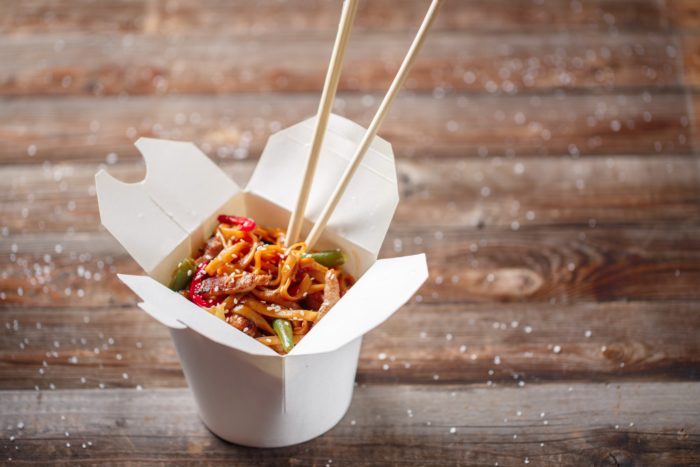Top Class Actions’s website and social media posts use affiliate links. If you make a purchase using such links, we may receive a commission, but it will not result in any additional charges to you. Please review our Affiliate Link Disclosure for more information.

Update:
- Food delivery apps GrubHub, Uber Eats, Postmates and DoorDash appealed a New York federal judge’s ruling that an antitrust class action lawsuit against them not be settled through arbitration.
- On March 16, U.S. District Judge Lewis A. Kaplan ruled the companies did not prove the plaintiffs agreed to arbitrate any claims. The companies filed a notice of appeal of his decision April 7.
- Plaintiffs Mariam Davitashvili, Adam Bensimon and Mia Sapienza say the defendants use their power to impose unlawful price restraints in their merchant contracts, which restricts competition and increases prices for consumers.
- The plaintiffs complain that the defendants entered into “No Price Competition Clauses” with restaurants, which prevents them from charging different prices for meal-delivery customers than they do to dine-in customers for the same menu items.
(April 15, 2020)
Consumers have filed a class action lawsuit against food delivery apps GrubHub, Uber Eats, Postmates and DoorDash, claiming the companies operate an unlawful monopoly.
Plaintiffs Mariam Davitashvili, Adam Bensimon and Mia Sapienza say that the defendants use their power to impose unlawful price restraints in their merchant contracts, which restricts competition and increases prices for consumers.
The plaintiffs complain that the defendants entered into “No Price Competition Clauses” (NPCC) with restaurants, which prevents them from charging different prices for meal-delivery customers than they do to dine-in customers for the same menu items.
The effects of the NPCC is that it acts as an unlawful price restraint which prevents restaurants from gaining market share by charging lower prices to consumers who choose to have their meal delivered or if they dine-in, the plaintiffs allege.
According to the customers, NPPCs harm consumers who purchase meals directly from restaurants in the meal delivery market, as well as those consumers who prefer to dine in the restaurant.
The result of the monopoly forces restaurants to charge competitive prices to customers who do not purchase their meals via delivery apps. This ultimately has the effect of driving those customers to the apps to avoid paying more, the meal delivery class action lawsuit states.
“Unable to offer consumers the increased choice of paying better prices to dine-in, restaurants have seen precious dine-in customers slip away year after year,” the customers maintain.
The GrubHub class action lawsuit allege that meals purchased via the delivery apps are more expensive due to additional fees. The defendants’ NPPCs then make clear that the restaurants must charge dine-in customers the same high fees, the plaintiffs say.
Restaurants have reportedly seen their dine-in market “cannibalized” by the defendants’ delivery apps and they bring this class action for “all Americans who would still enjoy a nice dinner out with their family before Defendants make that impossible.”
The Uber Eats class action lawsuit alleges that restaurants operate in an economic environment where even successful places have slim and diminishing profit margins.
Beginning in the 2000s, Online Meal Ordering Platforms (OMOPs) became popular as the rise of smartphones became the norm, the plaintiffs say.
The meal delivery class action lawsuit also states that, currently, the defendants do not share market power equally in each submarket. Instead, most submarkets are dominated by one or two of the defendants.
“In the case of OMOPs, the more consumers they have, the more restaurants they can lure, thus enabling them to lure more consumers, and so on,” the DoorDash class action lawsuit alleges.
The plaintiffs claim that the restaurants, however, are horizontal competitors with the defendants for food delivery services. Restaurants can offer a nearly identical product as the defendants, with the same functionality, the same ease for users, and the results are the same: delivering a meal to their customers.
In addition, the Postmates class action lawsuit alleges that delivery apps are monopolizing the labor market for delivery people, as they are an essential component of the market for meal deliveries.
They go on to maintain that experienced delivery drivers who know the local streets as well as the apartments could be more efficient than non-experienced delivery workers.
The customers also allege that the defendants do not maintain monopolies because of any special technology or that consumers prefer their products.

GrubHub admitted that consumers are increasingly indifferent to the value that the defendants’ platforms offer, instead choosing the local restaurant they like and utilizing the platform that the restaurant uses, according to the food delivery class action lawsuit.
In addition, the plaintiffs say that the delivery apps are forcing the restaurants to charge higher prices for their meal delivery items because of the defendants’ high fees. Also, independent restaurants have allegedly been hit hard by the defendants’ conduct.
The meal delivery class action lawsuit proposes two classes: 1) “All persons or entities in the United States who, from April 14, 2016 until the anticompetitive effects of Defendants’ unlawful conduct ceases, purchased meals directly from any restaurant that was contemporaneously contracted with the Delivery Apps (the ‘Direct Class’) and 2) All persons or entities in the United States who purchased Dine-In meals from any restaurant that was contracted with the Delivery Apps at any time from April 14, 2016 until the anticompetitive effects of Defendants’ unlawful conduct cease (the ‘Dine-In Class’).
Do you order food delivery service from the defendants? Let us know in the comments section below.
The plaintiffs are represented by Gregory A. Frank, Marvin L. Frank and Asher Hawkins of Frank LLP.
The Food Delivery Monopoly Class Action Lawsuit is Mariam Davitashvili, et al. v. GrubHub Inc., et al., Case No. 1:20-cv-03000, in the U.S. District Court for the Southern District of New York.
Don’t Miss Out!
Check out our list of Class Action Lawsuits and Class Action Settlements you may qualify to join!
Read About More Class Action Lawsuits & Class Action Settlements:
- Judge refuses to certify Chiptole class action over short-changing customers
- Judge gives $7.8M Celsius settlement over false preservative advertising final approval
- Polaner class action over spread false advertising should remain on docket, woman argues
- Poultry companies to pay $35M price-fixing settlement to Washington state















318 thoughts onGrubhub, Postmates, Uber Eats fight for arbitration in price-fixing class action
The fees they all charge are over exaggerated… first you have a service fee then a delivery fee then we get taxed on the combined amounts, and then you want me to pay a tip…so what’s the delivery fee for if I’m paying a tip….then if we have a credit the credit is applied to the entire total then taxed again..with another delivery fee and service fee. If you mess up a customer’s order charge the restaurant for the mistake and give us at least half of all those exaggerated fees back as well..I use these services often..and I’ve noticed that Walmarts delivery service does not charge all the fees. These companies take advantage of the convenience but remember the use of your services became popular during covids global shutdown..so without us you will have a less profitable corporation.
I’ve ordered from each service and they and they 100% charge way above dine in and have so many more charges on top of that.